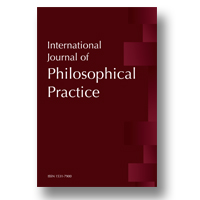|
|
|
1.
|
International Journal of Philosophical Practice:
Volume >
3 >
Issue: 3
Max H. Sotak
A Philosophical Mode of Life:
Pierre Hadot’s What is Ancient Philosophy?
abstract |
view |
rights & permissions
| cited by
This article presents Pierre Hadot’s treatment of a philosophical mode of life as it originated in ancient philosophy and fared down through the centuries. Hadot contends that philosophical discourse begins with a choice of life—an existential option from which philosophical discourse arises. The concept of philosophy as a purely theoretical attitude developed after the ancient period and reflects the domestication of philosophy within the context of the medieval and modern universities. The ancient schools of philosophy were concerned with a way of life that demanded the conversion of one’s being, a change of lifestyle, and a specific view of the world. Philosophical discourse, on this view, was designed to reveal, justify, and represent the existential option to the world.
|
|
|
|
|
|
|
2.
|
International Journal of Philosophical Practice:
Volume >
3 >
Issue: 3
Elliot D. Cohen
What Else Can You Do With Philosophy Besides Teach?
abstract |
view |
rights & permissions
| cited by
This article traces the rise of philosophical counseling in the United States, from its roots in the applied philosophy movement to the establishment of the National Philosophical Counseling Association, including a code of ethical standards for practitioners and a program for certification of philosophical counselors. The article demonstrates, through a brief discussion of the philosophical counseling modality of Logic-Based Therapy (LBT), how individuals who have Masters or Ph.D.’s in philosophy can become certified members of this burgeoning new profession.
|
|
|
|
|
|
|
3.
|
International Journal of Philosophical Practice:
Volume >
3 >
Issue: 3
James D. Patteson
Rational Buddhism:
Antidotes to the Eleven Cardinal Fallacies Presented in Elliot D. Cohen’s The New Rational Therapy from Buddha and Some of His Greatest Disciples
abstract |
view |
rights & permissions
| cited by
This article shows how Buddhist philosophies are consistent with the rational counseling approach of Logic-Based Therapy (LBT), as presented in Elliot D. Cohen’s book, The New Rational Therapy: Thinking Your Way To Serenity, Success, and Profound Happiness. It presents many Buddhist insights as pathways to the “transcendent” or guiding virtues of LBT, and, accordingly, as philosophical antidotes to its eleven “cardinal fallacies.” It therefore helpfully adds to the repertoire of philosophies that can be used by LBT counselors in helping counselees address their problems of living.
|
|
|
|
|
logic-based therapy case studies (selected practicum papers) |
|
4.
|
International Journal of Philosophical Practice:
Volume >
3 >
Issue: 3
Martha Lang
Philosophical Antidotes for Annie’s Anger
view |
rights & permissions
| cited by
|
|
|
|
|
5.
|
International Journal of Philosophical Practice:
Volume >
3 >
Issue: 3
Stefania Andretta
Nadia’s Anxiety About Choosing a Dissertation Topic
view |
rights & permissions
| cited by
|
|
|
|
|
6.
|
International Journal of Philosophical Practice:
Volume >
3 >
Issue: 3
Dusan Galic
A Counselee’s Vicious Cycle of Discontent Over Life Pursuits
view |
rights & permissions
| cited by
|
|
|
|
|
7.
|
International Journal of Philosophical Practice:
Volume >
3 >
Issue: 3
Mia Massaro
Using LBT to Balance a Counselee’s Grief About An Adult Son Who Rejects Her
view |
rights & permissions
| cited by
|
|
|
|
|
|
|
8.
|
International Journal of Philosophical Practice:
Volume >
3 >
Issue: 3
Danny Nichols
Molly and the Three Cardinal Fallacies:
A Successful Case in Logic-Based Therapy
view |
rights & permissions
| cited by
|
|
|
|





